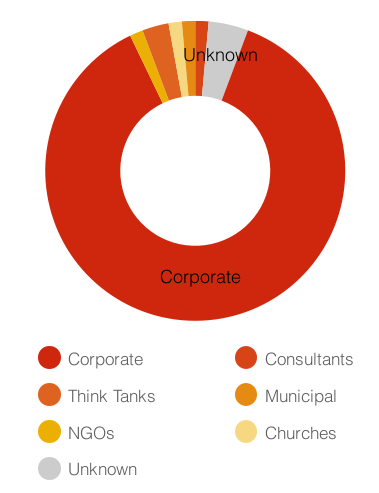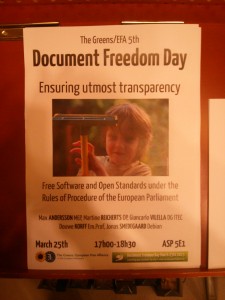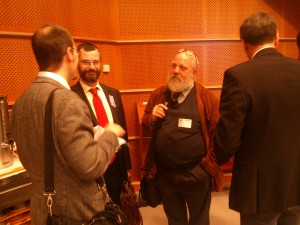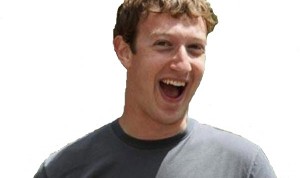Karsten on Free Software (original) (raw)
Please welcome Matthias Kirschner, FSFE’s new President
Posted by on Friday, September 18th, 2015 0
On Thursday, FSFE’s General Assembly has elected Matthias Kirschner as the organisation’s new president. Having worked closely with him for a decade, I’m hugely happy to see him step up to this role. Together with our new vice president Alessandro Rubini and executive director Jonas Öberg, we’ve assembled a team of exactly the right people to lead FSFE. I’m happy to hand over the reins of the organisation to them.
Matthias has filled a number of roles in FSFE. Starting as the organisation’s first intern, he was in charge of building the Fellowship program, has coordinated the German team, and has been responsible for FSFE’s policy work in Germany. As FSFE’s vice president for the past two years, he has made a huge contribution to setting the organisation on its present successful course.
The many people who make up FSFE put huge amounts of energy into driving software freedom forward. The challenges for Free Software have changed a lot over the past decade. We constantly need to think about how to maintain and defend our autonomy and agency in an age when governments and corporations are prying into every detail of our lives, every day.
In the face of these challenges, I’m proud of what we’ve achieved these past six years. FSFE has grown into a strong advocate for user’s rights, and an important voice in the debate around privacy and autonomy. FSFE is a rare beast in the NGO landscape, combining a large community of local activists and supporters with professional policy work at the EU and national levels. Getting these different lines of work to support each other is something that requires constant attention; but it’s also very rewarding. I know that making community involvement more effective is high on the agenda of Jonas and Matthias.
FSFE is a great organisation, and it’s in great shape. This is an excellent point to hand over the wheel to Matthias and Jonas, who are a supremely capable leadership team. I will give them my full support as a member of FSFE’s General Assembly, and look forward to seeing them help FSFE grow further.
While this means a change of roles for me, it’s not goodbye by any measure. My own next step is to join Siemens Corporate Technology as a consultant, starting September 21. My role will be to support the company in the use of Free Software, and help strengthen Siemens’ integration with the global Free Software community. Of course, I’ll also continue my volunteer engagement with FSFE as a member of the General Assembly.
I’ll see you around!
Lots of attention for Oettinger’s transparency problem
Posted by gerloff on Wednesday, June 24th, 2015 0
 It seems I’m not the only one interested in who the European Commissioner for Digital Economy and Society, Guenther H. Oettinger, is meeting with.
It seems I’m not the only one interested in who the European Commissioner for Digital Economy and Society, Guenther H. Oettinger, is meeting with.
This morning, Spiegel Online is running a thorough piece (in German, natch). Politico Europe has the story, too. And Transparency International is launching EU Integrity Watch, making it easy to see who in the Commission’s upper echelons has been seeing which interest representatives.
The upshot of all this? Oettinger is meeting almost exclusively with corporate lobbyists, or with people acting on behalf of corporates. According to Spiegel Online’s figures, 90% of the Commissioner’s meetings were with corporate representatives, business organisations, consultancies and law firms. Only 3% of his meetings were with NGOs. Of the top ten organisations he’s meeting with, seven are telecoms companies, most of whom are staunchly opposed to net neutrality.
Oettinger and Commission Vice President Ansip launched the Digital Single Market (DSM) package on May 6, including some last-minute tweaks that pleased broadcasters. During the weeks before the publication of the DSM package, Oettinger met with lots of broadcasters. His office also neglected to publish those meetings until we started pushing for the data to be released. Even in a Commission where three quarters of the meetings involve corporate lobbyists, Oettinger’s one-sidedness sticks out like a sore thumb.
With its decision to publish at least high-level meetings, the Commission has taken a commendable step to shed some light on the flows of influence in Brussels. In this regard, it is far ahead of most national governments other than those of the Scandinavian countries. Now that at least a bit of sunlight is flowing in, it’s easier to see the ugly spots. Oettinger clearly needs to be much more balanced in selecting his meeting partners. His superiors in the Commission need to make sure that he improves.
Farewell, for now
Posted by gerloff on Thursday, June 18th, 2015 0
This is a blog post that I’m writing with a wistful smile. About two years ago, I decided that I would eventually move on from my role as FSFE’s president. We’ve been preparing the leadership transition ever since. Now the time has come to take one of the larger steps in that process.
Today is my last day actively handling operations at FSFE.
Since our Executive Director Jonas Öberg came on board in March, I have progressively been handing FSFE’s day-to-day management over to him. From tomorrow, our Vice President Matthias Kirschner will take over my responsibility for our policy work.
I’m going to remain FSFE’s president until September. But I’m finally enjoying a luxury that was out of reach in previous years: I’m taking two months of parental leave, until mid-August. At FSFE’s General Assembly in September, we will elect my successor.
It’s been six intense and amazing years since I took over FSFE’s presidency. The organisation has grown a lot, and matured a lot. Our team has worked incredibly hard to promote Free Software, and to put users in control of technology. As I’m preparing to move on, I know that I’m leaving FSFE in great shape, and in very competent hands.
Being FSFE’s president is a great job. I’ve always considered that one of the main perks is the exceptional people I got to work with every day. What they all have in common is that they never give up. Each in their own way, they will bang their heads against the world until the world gives way. It’s time to publicly thank some of them.
Jamie Love is a prime example of that sort of person. Though he might not know it, he has taught me a lot about campaigning for a better, fairer society.
When I took the helm at FSFE, money was tight. We sometimes didn’t know how to pay next month’s salaries, and that was pretty scary. That the organisation the in excellent financial shape today is in no small part due to our Financial Officer Reinhard Müller, with his sound judgement and firm grip of the purse strings.
Carlo Piana and Till Jaeger are great lawyers to have on your side. (Much better than having them against you. Just ask Microsoft.) They have been extremely generous with their time, knowledge and skills. Shane Coughlan doesn’t so much face down adversity as talk to it gently, pour it a drink of whisky, take it for a walk, and hit it firmly over the head in a dark alley.
I’ve had help from a lot of people in lobbying for Free Software in Brussels. Not all of them would benefit if I thanked them publicly. So I’ll ask Erik Josefsson to stand in for them. He has been a relentless and resourceful advocate for software freedom in the European Parliament, and has received far less gratitude than he’s due.
FSFE’s Legal Coordinator Matija Šuklje is a universal geek in the very best way, and a close friend. He’s about to become a fine lawyer, though if he were to limit himself to lawyering, that would be an awful waste of talent. Fortunately, there’s not too much risk of that happening, as he’s never quite able to keep his nose out of anything that he finds even vaguely interesting.
Having Jonas Öberg take on the Executive Director role has been like putting a new gearbox into the organisation’s machinery. Everything has started to move more smoothly and efficiently.
Matthias Kirschner has been working with me all these years. He has moved through various roles in FSFE, continously taking on more responsibility. He’s had a great part in shaping our success. He is energetic, creative and razor sharp, and a very good friend to me. We couldn’t ask for anyone more skilled and dedicated to take over the role of FSFE’s President a few months from now, and I’m confident that the members of our General Assembly will agree.
These have been very good years for Free Software, for FSFE, and for me personally. As I move to a more supervisory role as a member of FSFE’s General Assembly, I look forward to seeing the seeds grow that we’ve planted..
And with that, I’d like to sign off for the summer. I’m still finalising what my next job is going to be – that’s something I’ll work out during a long vacation with my family, who deserve far more of my time than they’ve been getting.
See you on the other side!
Getting official on Oettinger’s lobbyist meetings [Update]
Posted by gerloff on Tuesday, June 16th, 2015 0
 We’ve been looking at how EU Commissioner Günther Oettinger is handling transparency on his meetings with lobbyists. Turns out, not very well. In response to our informal questions, the Commission updated the lists of meetings over the weekend.
We’ve been looking at how EU Commissioner Günther Oettinger is handling transparency on his meetings with lobbyists. Turns out, not very well. In response to our informal questions, the Commission updated the lists of meetings over the weekend.
There are two lists of meetings with interest representatives. The one for Oettinger’s cabinet (i.e. his team) looks reasonably complete. The list for the Commissioner himself, however, is a different story. Apparently, we are to believe that he has met just six lobbyists in the past four months. That would be an astounding lack of activity for the person in charge of some of the EU’s most contested policy issues: data protection, copyright reform and net neutrality.
[UPDATE: Oettinger’s team has continued to add meetings to the list. Both the lists for Oettinger himself and for his team look pretty reasonable now, at least up to the beginning of June. The most recent published meeting was on June 3, almost three weeks ago. There is a significant and unexplained gap in Oettinger’s list during April, with just one meeting listed for the period between April 1 and April 20. Oettinger’s Head of Cabinet, Michael Hager, has written to me and explained that a long-term sickness leave in the cabinet has led to a delay in publishing the meetings.]
Since the Commission apparently doesn’t fully respond to informal prodding, the excellent Kirsten Fiedler over at EDRi has filed an official request for access to documents. If you, like me, are curious about what’s keeping the EU’s digital czar busy, you can follow the request at AskTheEU.org.
In addition to the full list of meetings, it would be interesting to know what guidelines Oettinger and his team use when it comes to transparency on less formal meetings with lobbyists. Presumably, the Commissioner meets people not just at his office, but also at the events where he frequently appears as a speaker. This is a substantial hole in the Commission’s own transparency policy, and I’d love to know how Oettinger and his team are planning to fill it.
Oettinger’s transparency problem, part II
Posted by gerloff on Friday, June 12th, 2015 0
On Wednesday, I pointed out that Commissioner Oettinger, who handles matters of digital economy and society for the European Commission, has not been keeping up on publishing his meetings with lobbyists.
Though the Commission’s generic inquiry team hasn’t gotten back to me yet, I though I’d accelerate the process a little. So I’ve now sent a mail to the cabinet of First Vice President Timmermans, who is in charge of coordinating the Commission’s work on transparency:
Dear Ms Sutton,
dear Messrs Timmermans and Hager,I am writing to you with a question regarding the publication of meetings by Commissioner Oettinger and his cabinet with interest representatives.
When the Commission announced on November 25, 2014, that it would henceforth publish all meetings that the Commissioners and their teams held with interest representatives, this was universally welcomed. Especially civil society organisations like FSFE greeted this announcement as an important step which would serve to increase the trust of European citizens in the Commission.
At the Free Software Foundation Europe, we are highly appreciative of the results this has brought, and we value the efforts made by the Commission to increase transparency through this mechanism.
So it is with some regret that we feel the need to point out that, while most Commissioners and teams publish their meetings with great diligence, some are unfortunately not living up to the expectations set by the Commission’s announcement from November.
Given FSFE’s focus on matters of digital policy, we see a specific need to highlight that Commissioner Oettinger and his cabinet appear to be somewhat behind on publishing their meetings on the relevant web pages.
The last meeting which Commissioner Oettinger has published took place on February 20, 2015:
The most recent published meeting of one of the Commissioner’s team members took place on March 25, 2015:
Given that Commissioner Oettinger is heading up, together with Vice President Ansip, one of the Commission’s flagship initiatives (which, accordingly, is hotly contested), the Digital Single Market, we submit that the highest standards of transparency on meetings should be applied here.
We hope that the Commission, and in particular Commissioner Oettinger and his cabinet, will see themselves able to update the published list of meetings at the earliest opportunity. We believe that a formal Request for Access to Documents is not needed to deal with such a routine matter, and are confident that the Commission will quickly move to rectify the situation.
In closing, please let me reiterate FSFE’s deep appreciation of the Commission’s commitment to transparency.
Sincerely,
Karsten Gerloff
President, Free Software Foundation Europe
Let’s see if this brings any results. If not, there’s always the formal request for access to documents. But if we had to resort to this tool in order to remind the Commission of its own commitments, that would amount to a confession of failure on the part of the EC.
Oettinger has a transparency problem
Posted by gerloff on Wednesday, June 10th, 2015 0
In November of last year, the European Commission loudly trumpeted a new-found commitment to transparency. In a press release, it said that from now on, all meetings between Commissioners, their team members (the “cabinet”) and interest representatives would be made public. I was always curious how well this promise would hold up in practice.
Not very well, it seems now. The meeting pages for the EU Commissioner for Digital Economy and Society, Günther Oettinger, look rather deserted. If the pages are to be believed, Oettinger last met anyone on February 20, while his cabinet members at least interacted with lobbyists until March 25.
Given that Oettinger appears to be alive and well, I am curious about what’s going on here. As a first step, I have informally contacted the Commission and requested that the pages be updated. If I don’t get a reply within the advertised three business days, I will file a request for access to documents.
Here’s my mail to the Commission:
Dear Madam, Sir,
on November 25, 2014, the Commission issued a press release [http://europa.eu/rapid/press-release\_IP-14-2131\_en.htm\] announcing that all meetings by Commissioners and their cabinets would be made public on the Commission’s website.
It appears that in the case of Commissioner Oettinger, the EC has fallen behind somewhat on this commitment.
On the relevant web page, the latest meeting listed for Commissioner Oettinger took place on Feb. 20, 2015. The latest meeting listed for members of his cabinet was on March 25.
You will agree that this state of affairs is not satisfactory with regards to transparency. I would like to request that you provide me – and ideally my fellow citizens – with comprehensive information on the meetings held by Commissioner Oettinger after February 20, 2015, and those held by his cabinet members after March 25, 2015.
While I would be happy to receive this information by email, I would much prefer if the relevant web pages were simply updated to reflect the most recent meetings.
Thank you for your assistance.
With kind regards,
Karsten Gerloff
Facebook offers to send you encrypted emails. This won’t help you.
Posted by gerloff on Monday, June 1st, 2015 0
Facebook announced today that the company will let users upload their OpenPGP public keys to the site. This way, the company can encrypt the emails that it sends to its users.
Here's laughing at you, babe.
When one of the world’s most-visited websites adds encryption capabilities, that’s normally a cause for applause. But on second thought, there’s very little here that makes Facebook’s users better off.
This change does nothing to protect you from Facebook’s surveillance. The site’s working principle is to maximise the amount of data it sucks in about its users. And it’s not just the site: Through its ubiquitous “Like” buttons and similar tools, Facebook follows you wherever you go on the web, and builds up a detailed profile of your behaviour.
The company then does with its users what the banks did in the years leading up to the 2008 financial crisis: Slice them into ever-finer demographics, parcel them up, and sell them to advertisers. Whether they send their emails to you encrypted, in plain text, by coach or by carrier pigeon doesn’t make any difference.
Adding encryption to the channel between you and Facebook also does very little to protect you from government surveillance. While state actors, and other people tapping your line, might not be able to read the contents of the messages, they have full access to the subject line and the metadata (who sent the message, who received it, when, and so forth). If the US government is in any way interested in what you’re doing on the site, they only need to ask. The same goes for any other government with which, in order to be allowed to operate, Facebook has cut a deal to rat out its users, such as China.
This step doesn’t even really have the benefit of getting more people to use end-to-end encryption. I’d be very surprised if anyone decided to start using GnuPG or similar tools because of this; Facebook provides no real motivation to do so.
The only benefit for users from this step is that things like password reset messages are now better protected from interception.This will somewhat reduce the risk of identity theft via Facebook, though of course it won’t prevent it from happening. Still, this may somewhat reduce disruptions to Facebook’s business. If we let the company get away with it, they might even succeed with their message of “we’re using crypto, so we’re the good guys”.
This isn’t a step to make you better off. It’s a step to make Facebook better off.
“Utmost transparency”, Free Software, and disintermediating the lobby business
Posted by gerloff on Thursday, March 26th, 2015 0
Just how transparent does the European Parliament have to be?
In its own rules of procedure, the Parliament has set itself the high standard of conducting its affairs in “utmost transparency”. But what does this mean in practice?
For five years running, the Green group in the European Parliament has celebrated Document Freedom Day together with us. The focus of yesterday’s event was a recent study titled “Ensuring utmost transparency – Free Software and Open Standards under the Rules of Procedure of the European Parliament”. I recommend that you get the PDF and read it for yourself — it’s well worth your time.
Thanks to MEP Max Andersson, his assistants, and the always wonderful Erik Josefsson, we had a great panel lined up. With Professour Douwe Korff and lawyer Carlo Piana, two of the study’s authors were present to run us through the findings. The study brought many important results.
Why Open Standards and Free Software are essential for transparency
It points out that “utmost transparency” isn’t the same as making information available on request. Requests for access to documents (or Freedom of Information requests, as they’re called elsewhere) belong to the traditional approach, where information is secret by default, and you might get an exception if you ask really nicely.
This might have been acceptable in a pre-digital era, where information largely lived on paper, and gathering, storing and publishing it was expensive and difficult. Today, much of this work can be automated. It’s no longer acceptable to reveal information only when someone happens along to ask for an item in precisely the right way. Information about making policies and laws needs to be public by default.
The study argues that Open Standards are necessary for the Parliament to achieve its goal of “utmost transparency”. The lawmaking process is only really transparent if it can be analysed and reviewed by anyone, on any software platform, without having to ask anyone for permission. This is something that only Open Standards can deliver.
The authors highlight that transparency isn’t a state; it’s an ongoing process. In order to continuosly deliver transparency through Open Standards, the Parliament needs to avoid being tied to any particular IT vendors. Instead, it should use Free Software wherever possible.
How the EP does on transparency – inside and outside views
Four panelists were there to discuss the study, and think about how its results might be put into practice.
Giancarlo Villela is the Director of DG ITEC, and thus responsible for the European Parliament’s IT systems. He pointed out that his team’s primary obligation was to keep those systems running, to make sure that the Parliament could do its work; but that they felt equally obliged to guarantee the security of the Parliament’s IT systems, and to make the Parliament’s work accessible to the public.
He highlighted that he wants the Parliament to be “avantgarde” in IT, taking leadership on transparency and openness among the European institutions. For all the things we at FSFE wish the EP’s IT systems would do better, I need to point out that the Parliament is indeed doing better on this front than the European Commission, let alone the Council, which sometimes seems to communicate its work to the public primarily through leaks. Now if the Parliament could only get its live streams of plenary sessions working for Free Software users, and make them easily accessible…
Martine Reicherts is the Director General of the EU´s Office for Official Publications in Luxembourg, and a former European Commissioner for Justice. She talked about her office’s effort to make EU legislation available and searchable in a way that’s useful for specialists. She said that it took her four years to make European law texts available free of charge. The publications office’s current challenge is to make the data searchable: “If you know a search engine that can efficiently handle 1.3 billion triple-store sets, let me know.”
Jonas Smedegaard is a Debian developer. He has worked quite a lot on the practicalities of making the EP’s systems more transparent. He created the DebianParl distribution, a version of Debian GNU/Linux aimed at people working in the Parliament, and has maintained a constructive dialogue with DG ITEC on actually getting the thing working. (“Constructive dialogue” is Brussels lingo for “an ongoing and sometimes lively argument”.) With his experience at the coalface of transparency, he had quite a few suggestions to make as to what the Parliament’s IT systems could be doing better — especially using standard protocols to handle email, rather than Microsoft’s proprietary tools.
Transparency and legitimacy
I was the final speaker on the panel. With most of the practicalities addressed, I took the opportunity to make a few broader points:
- Transparency is essential for the legitimacy of the European institutions. If the Parliament, the Commission and the Council want fewer people to complain about their lack of legitimacy, then utmost transparency is an excellent way to go.
- Currently, some of the best transparency tools around the EP are provided by volunteers, for example ParlTrack. This is no way for the EU’s central democratic institution to go about its business. The Parliament should do two things. It should make raw data and metadata about laws, amendments, and its members publicly available in real time. And it should provide some tools to help people make sense of the data. Many people and organisations will still choose some other way to have the data presented to them according to their needs; but the Parliament needs to provide at least a first entry point for the public.
- Ideally, this sort of transparency will disintermediate today’s lobbying industry. A lot of people in Brussels and elsewhere spend a lot of time simply keeping track of what happens in the Parliament, in the Commission and the Council. Legions of analysts parse an endless stream of decisions, reports, white papers, speeches, and so forth. Lobby firms – and political NGOs like FSFE – base their influence not so much on superior knowledge of their subject matter, but rather on knowing what’s going on, where to look for information, and who to call in order to find out more. Greater transparency, especially through publication of real-time data on policy making, would make it possible for anyone to create tools to analyse this data. This, in turn, would hopefully make it easier for ordinary citizens to understand a given policy process, and to get involved.
Looking at it this way, Villela’s DG ITEC isn’t just running the EP’s IT systems for the Parliament’s own use. These way these systems are built and run determines how much access Europe’s citizens get to the lawmaking process, and how well they can understand it. These systems play an important role in determining the political legitimacy of the European Parliament, and by extension of the other EU institutions.
That’s a large responsibility for an IT department to carry. But there you have it.
I want to love the future. That’s why I love Free Software
Posted by gerloff on Friday, February 13th, 2015 0
In the 1990s and early 2000s, we believed that we with digital technology and the internet, we were building a utopia. And my, has the comedown been harsh, as we discovered that we had built all the tools for a surveillance state instead. We enthusiastically took to platforms like Facebook and Google and fed them with every last detail about our lives.
We did this for the search results and the cat pictures and to have a better way to coordinate pub nights with our friends. All the while, the giants of flesh and steel who we thought were weary were hauling our secrets out through the back door by the truckload. Those platforms aren’t public spaces. They’re like shopping malls, with their own mean little sets of rules. We’re only ever allowed there on their terms, and they watch everything we do.
Using a device with stock Android puts me in the same state of anxious watchfulness that I get when I walk through a crowded railway station. There are data pickpockets lurking at every turn, waiting for me to be distracted for a second, perhaps by one of the dozens of dodgy deals that are constantly shoved in front of me.
I look at Ethiopia, the world’s first off-the-shelf surveillance state, it’s our own future that I see. Given how internet policy in the western world has evolved over the past decade and a half, Halvar Flake is right in saying that most democracies are two terror strikes and one opportunist away from a dictatorship.
But it doesn’t have to be this way.
We have powerful tools that help us defend and regain the freedoms we’ve lost, and the ones we’ve given up. We can use GnuPG to securely encrypt our files and our communication. We can use Tor to browse more or less anonymously. In a perfect world we wouldn’t need these tools; but this world isn’t perfect, and so we need them. Anyone who asks you to use non-free crypto and privacy tools is either a fool or a liar. There’s just no way to put this more mildly.
We can avoid giving up data and control out of sheer laziness. If you tell me that you don’t want to pay around 10€ a month for email and hosting while fiddling with your 500€ smartphone, then I’ll say that you’ve got your priorities wrong. For a lot of the things that you can do with Google, Facebook and all the other stuff, you can find self-hosted Free Software programs that do much the same, while putting you in the driving seat. And that’s before we even mention approaches like open data, which we can combine with Free Software to put more power back in people’s hands.
This is Valentine’s Day, and we’re supposed to think of the people we love. Let’s teach them the skills that they’ll need to protect their freedom in a world that’s only ever going more digital. If you host your mail with one of the big providers, you’re exposing everyone you exchange messages with to government surveillance. If there’s someone you love, don’t force them to communicate with you through these platforms. Instead, give them the skills they need to retain their autonomy in today’s world.
In the end, we’re making the bed that we are going to lie in. Our choices today help to determine the future that we’ll live in. Not only do we have choice; we constantly exercise choice, whether by commission or by omission.
We’re always building something. We can build the tools of oppression, or we can build the tools of freedom.
We can teach. We always teach, mostly by example. Let’s make sure that we teach freedom to our children and our friends.
We’re always making choices. By choosing the technology we use, we build the world we’ll live in tomorrow, bit by bit. That’s why I choose Free Software: So that we can live in freedom tomorrow.
New horizons
Posted by gerloff on Monday, January 26th, 2015 0
By October this year, FSFE will have a new leadership team. When my current (third) term as the organisation’s president comes to an end this autumn, I will hand over the role of president, and move on to new horizons.
FSFE is in a great place right now. We’re making a bigger impact than ever before. We sharpened and refocused our mission during 2014, and developed a new strategy focused on empowering users. We are reaching more people than ever before, and have very good traction with policymakers. People value what we do: Thanks to our Fellows and donors, FSFE’s finances look better than they ever have.
FSFE’s fierce independence and focus on the long term make it a very special place to work. My current job is a wonderful vantage point from which to explore the world. But from time to time, it’s good to change one’s perspective and seek out new challenges.
Come October, Matthias Kirschner will take over as president, pending confirmation by FSFE’s General Assembly. Having worked very tightly with him for the past years, I can confidently say that he is the single best person to take FSFE forward into the future. He knows the organisation inside out, takes to policy work like a duck to water, and is very good at getting people to work together. He will make an excellent president.
Before then, in March, we’re taking on board an executive director. This will be a someone who has been with FSFE from the start: Jonas Öberg, one of FSFE’s founding members and a former vice-president. Jonas has considerable experience in managing Free Software-related projects and organisations. This includes building up the FSCons conference in its original form, acting as Creative Commons’ coordinator for Europe, his latest venture Commons Machinery and and the Elog.io project. We couldn’t have found a better person for this role.
So, what are you doing next?
Professionally, I’m going to look for a role where I can make a difference, and bring to bear the skills I’ve learned running FSFE. I’d love to continue working with digital freedoms, strategy, and policy. This could be at the helm of another NGO, or as part of a larger organisation or company. If you would like to discuss potential opportunities, I’ll be delighted to hear from you.
With regard to FSFE, I will remain part of the General Assembly, and will give my full support to Matthias and Jonas as they drive the organisation forward. Wherever my work will take me, FSFE and the Free Software community will always remain close to my heart.

